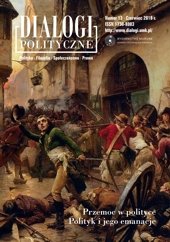Relacje pomiędzy politykami a wywiadem na podstawie amerykańskich oraz brytyjskich intelligence studies1
DOI:
https://doi.org/10.12775/DP.2010.024Abstrakt
The main aim of the article is to describe and explain relationship between government and intelligence services. Article is based on simple dichotomy – there are the politicians and the analysts. Those groups have their own interests, problems and preferred solutions of these problems. Scholars analysing this domain often represent conflicting interests, though they find different patterns of behaviors and interpretations. The article shows that by bringing those interpretations up, there might be an insight into decision making processes on the national level. Article theses are founded on the intelligence studies – scientific inquiries about intelligence services. The author’s main interest is the intelligence analysis and that is why other dimensions of intelligence services’ activities are absent. For example, the author omits covert action and collection of information. Although these types of intelligence services’ activities are important, they are not crucial for the analysis. The concept of intelligence cycle is a useful theoretical approach. Its model describes relations between politicians demanding results from intelligence services and a way of processing those requests. Intelligence cycle indicates also that after fulfilling demands from politicians, there is necessity of feedback from their side. Without further questions based on earlier findings, there is no understanding between politicians and analysts. The former do not get the results they want, the latter do not know how to proceed. An essential controversy is the degree of cooperation between decision makers and analysts. There exists a whole range of potential solutions of this dispute and article describes a few of them. The author uses the example of USA to explain mentioned controversy because development of relations between politicians and analysts in this country has been thoroughly investigated. That is why the examination of American inquiries may offer better understanding of this important relationship.Bibliografia
M. Warner, Wanted: The Definition of Intelligence, „Studies in Intelligence” 2002, t. 46, s. 15– 22. Dostępne na: https://www.cia.gov/library/center-for-the-study-of-intelligence/csipublications/csi-studies/studies/vol46no3/article02.html [dostęp: 1.04.2010].
M. Herman, Potęga wywiadu, Warszawa 2002, s. 289–290.
G. F. Treverton, Reshaping National Intelligence for an Age of Information, Cambridge 2003.
R. Johnston, Analytical Culture in the US Intelligence Community. An Ethnographic Study, Washington 2005, s. 47–49.
A. S. Hulnick, What's wrong with the Intelligence Cycle, „Intelligence and National Security”2006, t. 21, nr 6.
A. Rolington, Objective Intelligence or Plausible Denial: An Open Source Review of Intelligence Method and Process since 9/11, „Intelligence and National Security” 2006, t. 21, nr 5, s. 748.
L. K. Johnson, Preface to a Theory of Strategic Intelligence, „International Journal of Intelligence and Counter Intelligence” 2003, nr 16, s. 651.
C. Andrew, Intelligence, International Relations and “Under-theorization”, „Intelligence and National Security” 2004, t. 19, nr 2, s. 180. Por. A. Orlov, The Theory and Practice of Soviet Intelligence, „Studies in Intelligence” 1963, t. 7, nr 2.
R. L. Garthoff, On Estimating and Imputing Intentions, „International Security” 1978, t. 2, nr 3, s. 29.
A. Codevilla, Informing Statecraft. Intelligence for a New Century, New York 2002, s. 203–204.
R. Hilsman, Strategic Intelligence and National Decisions, Glencoe 1956.
J. Davis, Intelligence Analysts and Policymakers: Benefits and Dangers of Tensions In the Relationships, „Intelligence and National Security” 2006, t. 21, nr 6, s. 999.
J. Davis, A Compendium of Analytical Tradecraft Notes. Tom I (notes 1– 10), Washington 1997, s. 1.
J. A. Barry i in., Bridging the Intelligence-Policy Divide, „Studies in Intelligence” 1994, t. 37, s. 1–8.
O. Leslau, Intelligence and Economics: Two Disciplines with a Common Dilemma, „International Journal of Intelligence and CounterIntelligence” 2007, t. 20, nr 1, s. 106–107.
M. Weber, Polityka jako zawód i powołanie, [w:] tenże, Polityka jako zawód i powołanie, Kraków 1998.
Z. Siemiątkowski, Wywiad a władza. Wywiad cywilny w systemie sprawowania władzy politycznej PRL, Warszawa 2009.
Pobrania
Opublikowane
Jak cytować
Numer
Dział
Statystyki
Liczba wyświetleń i pobrań: 920
Liczba cytowań: 0



